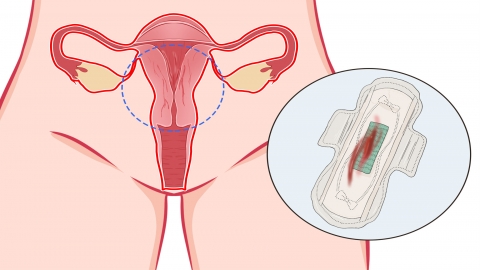What causes menstrual blood clots?
Menstrual clots may result from slow menstrual blood discharge, cold exposure, endometritis, uterine fibroids, adenomyosis, and other conditions. These can be improved through lifestyle adjustments, staying warm, and medical treatments. If there is a large amount of clotting accompanied by worsening abdominal pain, prompt medical attention is necessary.
1. Slow menstrual discharge: When menstrual blood remains in the uterine cavity for an extended period, red blood cells break down and coagulate into clots, leading to clot formation without significant discomfort. It is recommended to engage in moderate physical activity during menstruation to facilitate blood flow and avoid prolonged sitting or bed rest.
2. Cold exposure: Abdominal cooling during menstruation causes blood vessel constriction, slowing blood circulation and promoting clot formation, possibly accompanied by a cold sensation in the abdomen. It is advised to keep the abdomen warm during menstruation, drink warm water or hot soups, and avoid raw or cold foods.

3. Endometritis: Bacterial infection causing inflammation of the endometrium can interfere with normal menstrual flow, resulting in increased clotting, along with lower abdominal pain and abnormal vaginal discharge. Under medical guidance, medications such as Cefuroxime Axetil Tablets, Metronidazole Tablets, and Gynecological Qianjin Tablets may be used to alleviate symptoms.
4. Uterine fibroids: Benign tumors formed by the proliferation of smooth muscle tissue in the uterus can impair uterine contractions, leading to poor menstrual outflow and clot formation, often accompanied by heavy menstrual bleeding and prolonged periods. Under medical supervision, medications such as Mifepristone Tablets, Guizhi Fuling Capsules, or Levonorgestrel-Releasing Intrauterine Systems may help manage symptoms.
5. Adenomyosis: The invasion of endometrial tissue into the muscular wall of the uterus leads to an enlarged uterus and abnormal contractions, obstructing menstrual flow and causing clot formation, typically accompanied by progressively worsening dysmenorrhea. As directed by a physician, medications such as Danazol Capsules, Gestrinone Capsules, or Ibuprofen Sustained-Release Capsules may be used to relieve symptoms.
For daily care, it is important to stay warm and avoid cold exposure during menstruation, maintain regular sleep patterns without staying up late, eat a light, balanced, and nutritious diet, exercise moderately to strengthen physical health, and maintain a positive mindset to minimize emotional fluctuations.




